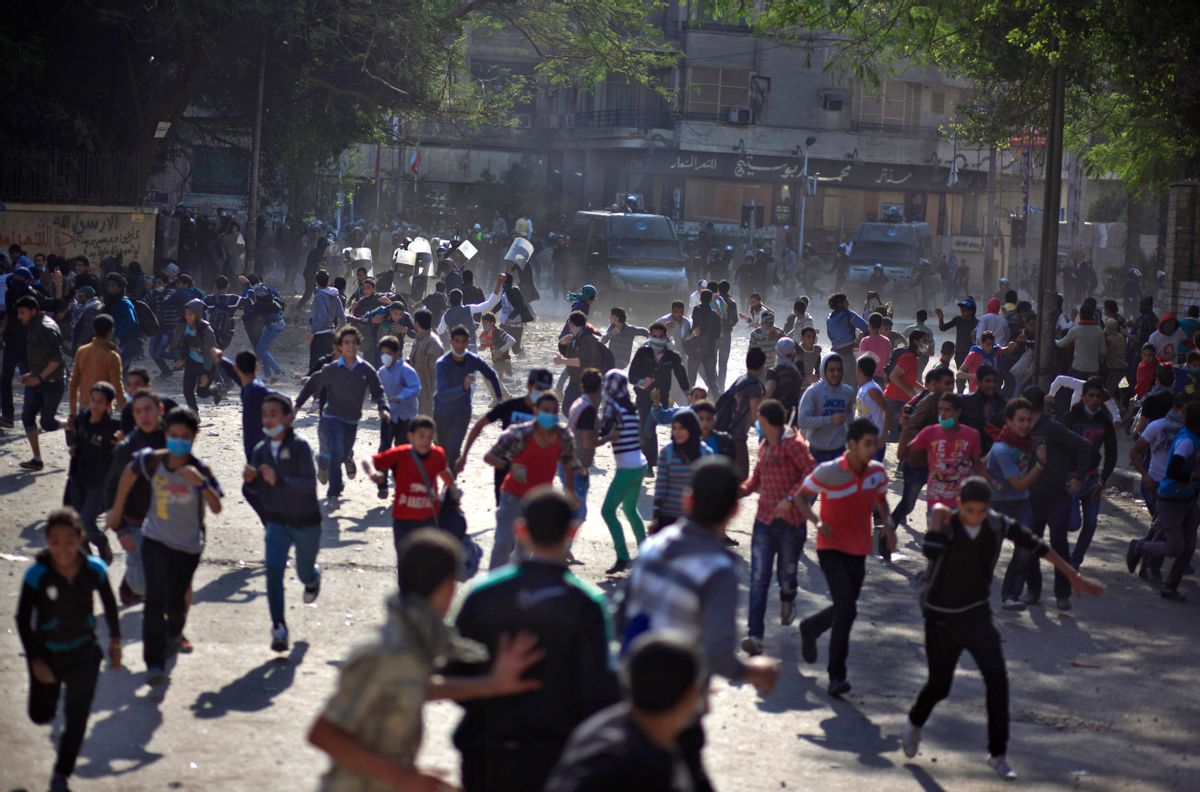 CAIRO, Egypt — Egypt's politicians are offering their constituents a near impossible choice: either accept a rushed constitution written by Islamists, or accept the kind of authoritarian government Egyptians have fought hard to defeat.
CAIRO, Egypt — Egypt's politicians are offering their constituents a near impossible choice: either accept a rushed constitution written by Islamists, or accept the kind of authoritarian government Egyptians have fought hard to defeat.
Since neither choice appeals to a majority of Egyptians, they have instead turned out in large numbers to protest.
Egyptian President Mohamed Morsi says he needs the new, sweeping powers to protect Egypt from an activist judiciary dominated by holdovers from the era of toppled dictator Hosni Mubarak.
Morsi said he would give up these new powers as soon as a new constitution is drafted. So after protests erupted, the Islamist-dominated constituent assembly resolved to diffuse the situation by ramming through an already controversial draft constitution.
“It’s not even an ultimatum, really. You get a constitution that’s quite crappy, and you’re stuck with a president whose decisions you cannot challenge,” said Ziad Akl, a senior political researcher at Al Ahram Center for Political and Strategic Studies. “This has nothing to do with a transition toward democracy, but a lot to do with creating a new autocratic or dictatorial elite.”
The current melee erupted last week when Morsi announced a presidential decree immunizing his edicts from judicial review. It was a bid, some analysts say, to shield the Muslim Brotherhood-led constituent assembly from a Dec. 2 Supreme Constitutional Court hearing on the body’s legality. The Supreme Court is likely to dissolve the assembly outright, threatening the mandate Islamists won during the country's first-ever free parliamentary elections.
Several top level courts went out on strike in response to Morsi's decree.
The crisis has pitted the newly-elected Morsi and his Muslim Brotherhood organization against both Egypt’s judiciary and a growing, street-led opposition to his rule.
Three have been killed in clashes across Egypt, and massive demonstrations against Morsi’s decree filled Cairo’s iconic Tahrir Square on Tuesday, with some activists comparing Morsi to Mubarak.
The announcement that the constituent assembly would finish its final draft of the constitution on Wednesday only appeared to deepen the impasse.
Brotherhood assembly members said they would send the document to a committee vote on Thursday, despite threats of mass resignations from liberal and secular representatives still battling the Islamists over articles pertaining to Sharia law.
Opposition activists have little choice now but to mobilize street protests and pressure assembly members to resign, depriving the body of legitimacy, Akl said.
“The draft fails [to protect] the rights of women. Some of the most extremist groups want to eradicate some of the most hard-won rights of women,” Mona Makram Ebeid, a former Member of Parliament, told GlobalPost last month. She resigned from the assembly earlier this year.
Akl said a hurried, Islamist-dominated vote on the constitution means “there is absolutely no spirit of coexistence,” and that the Brotherhood is pushing a dangerous “rule of the majority” that will alienate and sideline minority groups already fearful of Islamist rule.
He says that if dueling demonstrations by pro- and anti-Morsi camps in Tahrir on Friday and Saturday turn violent, it could “change the whole structure of political opportunity, make the state more vulnerable and the revolutionary forces more cohesive.”
Hani Sabra, an analyst at Eurasia Group, a New York-based political risk consultancy, also says violence could fundamentally shift the crisis.
“Egypt’s societal split would sharpen,” he said. “[The Muslim Brotherhood] is no longer an opposition group […] Deaths at the hands of its supporters and the police will probably not cost the group support among its core, but support among the broader public could soften.”
Still, the Brotherhood’s larger fight appears to be with what its members say is a pro-Mubarak judiciary that is already deeply suspicious of the Islamists.
Earlier this year, Egypt’s highest court dissolved both an Islamist-led constitutional committee and the Brotherhood-led parliament, leading some Brotherhood members to charge that the country’s judges are still loyal to Mubarak, and cannot be trusted to rule impartially. Parliamentary elections are expected 60 days after a constitutional referendum. In the meantime, legislative power is vested in the president.
“The problem with the judiciary is with the elder [members]. They were very close to the Mubarak regime,” Gehad Al Haddad, a senior adviser to the Muslim Brotherhood, told GlobalPost. “There was personal assignment of some state resources as gifts to some of the judges — and the judges know that, but they don’t discuss this publicly.”
The rift widened Wednesday when Egypt’s highest appellate court announced an open-ended strike against Morsi’s decree — and members of Egypt’s Judges’ Club told local daily, Al Masry Al Youm, that their own strike had reached “99 percent” of the nation’s courts.
Members of the Supreme Constitutional Court accused Morsi of launching a campaign against prominent judicial figures. In a televised address Wednesday, the court’s deputy chair, Maher Sami, said the court “will not be terrorized by any political pressure.”
The thousands-strong Judges Club had previously threatened to boycott overseeing the referendum on the constitution, after its members said they were marginalized during the drafting process. Without a smooth vote, any new constitution would face a fresh crisis of legitimacy, analysts say.
“Even if the authorities do press ahead with a public referendum on the draft constitution, with thousands of judges on strike it will be difficult to monitor the elections,” Sabra said.

Shares